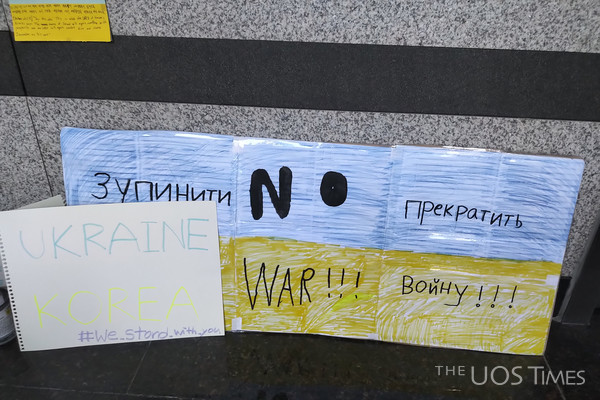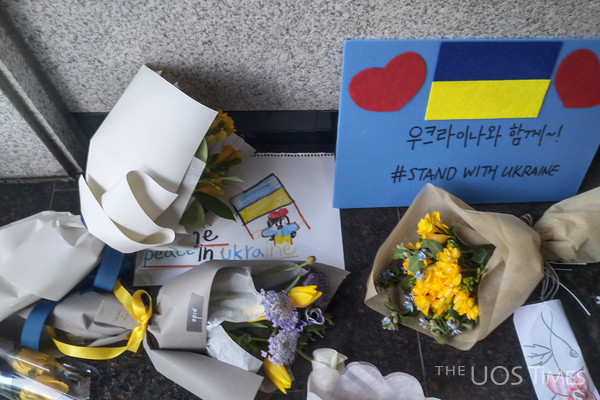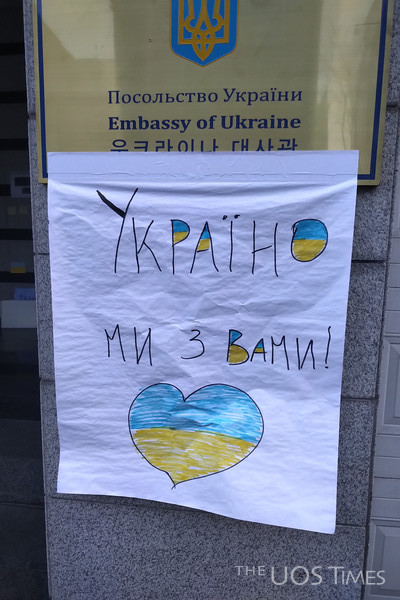On February 24, 2022, 04:50 (UTC+2), Kyiv, the capital city of Ukraine, was bombarded by Russian artillery, following the military command by Vladimir Putin, the Russian national leader, for “special military operation” within Ukrainian territory. Since then, Ukraine is at war with Russia, struggling to defend its land and the people. Russia is one of the world’s most powerful countries, and the use of nuclear weapons is assumed possible; thus, the regional war is gaining worldwide attention.
The superficial reason for Russia’s invasion, as stated by President Putin, is to “demilitarize and denazify Ukraine.” He and the Russian government claim that the anti-Russian policy of Ukraine is threatening the people living in the respective areas. However, there are additional possible reasons for Russia wanting the war. The first is Ukraine’s demand to join the North Atlantic Treaty Organization (NATO). Although it had been controversial even among the Ukrainians, the majority of people, as well as the Ukrainian government, called for Ukraine to join NATO because of the Crimean Crisis back in 2014. However, to Russia, NATO expanding toward the east by including Ukraine is a major military threat as the latter shares the fourth-largest border with Russia. Thus, NATO might have access to the most convenient overland route straight to Moscow, Russia’s capital city, if Russia fails to stop Ukraine from joining the organization. However, most of the NATO states were against Ukraine acquiring the membership.

Western and Pro-Western states are endorsing Ukraine, demanding Russia to terminate the attack toward Ukraine. “Enough is enough,” said the United Nations Secretary-General António Guterres, on February 28, 2022, adding “The fighting in Ukraine must stop now.” Four days prior, on February 24, US president Joe Biden stated that Russia’s attack toward Ukraine was “without provocation, without justification, without necessity.” Meanwhile, some countries are supporting Russia. On February 2, the Ministry of Foreign Affairs of the People's Republic of China stated that China cannot agree on calling the recent Russian military movement in Ukraine an invasion, adding that the United States and other western countries have intensified this crisis.
Economic and cultural sanctions against Russia are in process. The Society for Worldwide Interbank Financial Telecommunication (SWIFT) blocked Russia from its transaction network. Global credit rating agencies, including S&P, Moody’s, and Fitch, degraded the credibility of Russia. Consequently, Russia is suffering from serious economic damage. The value of the Ruble, the Russian currency, compared to the United States Dollar, dropped by 30 percent on February 28 and did not show any significant increase ever since. The Central Bank of the Russian Federation had no choice but to increase the base rate from 9.5 percent to 20 percent. Being excluded from the SWIFT network, Russia is currently unable to spend the 40 million USD deposited in foreign banks.
As for South Korea, President Moon Jae-in, on February 24, said “There is no justification for the use of force causing innocent human casualties,” adding, "Ukrainian territorial integrity and sovereignty must be guaranteed." However, although Korea participated in the global sanction, the Korean government did not carry out its own economic sanctions toward Russia. Korea seemed arguably hesitant about the sanctions; thus, it failed to win exemption from Foreign Direct Product Rule (FDPR), as confirmed on February 27. FDPR is a trade sanction that can be an obstacle for Korea when trading with the United States. Later that day, the Korean government decided to grant 10 million USD for Ukraine as humanitarian aid as well as additional military uniform support. Moreover, Korea decided to ban the export of strategic materials to Russia. With such sanctions activated, Korea finally managed to win exemption from FDPR on March 3.
The following is an interview with an anonymous Russian student, studying in Korea.

Q. What is the common opinion for the Russians, in particular for the younger generation, about the war?
A. I think most of the Russians in their 30s or under are opposing the war. Many of them are feeling guilty for hurting Ukrainians, both emotionally and physically, and are feeling the responsibility to stop the current violence. However, not everyone agrees with us. Some people spent their youth in the Cold War era. They are very sensitive to the national security of Russia. Ukraine has become a threat to Russia, therefore they think it is better to destroy them rather than solve the issue in peace. Moreover, some extremists want to reunite the past Soviet Union and make Russia powerful again, hoping Putin will grant their wishes. This war, in alignment with the annexation of Crimea, can be a stage toward it.
Q. Has President Putin experienced any change in his approval rate over the war issues?
A. On the chart, yes. Ironically, the approval rate has gone up, just like the times back in 2014 when Putin was successful with the Annexation of Crimea. Possibly, it is because Putin is demonstrating his power or leadership, regardless of the righteousness of its origin, quite successfully to his supporters. As I said, some people want Russia back to the period of the Soviet Union more than we can think or hear from.
Q. As a Russian citizen, what do you think about the economic sanctions against Russia?
A. Even abroad, I feel the impact of the sanction. The biggest one is the international banking issues. I am having trouble receiving the allowance I get for the tuition and the living expenses from my family. I can’t even get paid properly online. As far as I can feel and see on the news or social media, the sanctions are quite effective—at least in the citizens’ lives. I feel very sorry for the fact that the Russian citizens are suffering because of the war between the superpowers.
Q. Have there been any movements in Russia calling for Putin to end the war?
A. There are, and there have been some movements against them. On the one hand, I heard that in Moscow, thousands of people have been participating in demonstrations against the war, only to be arrested by the police. Alexei Navalny, the currently jailed political rival of Putin, has been calling for people to protest against the government on the violence in Ukraine. On the other hand, I do see some movements advocating for the war and the government. The social media influencers and the press are usually the ones in favor of the war. Most probably, they are backed by the government.
Jean-Paul Sartre, the renowned philosopher once said, “When the rich wage war, it's the poor who die.” It is an exact depiction of the current war in Ukraine. The power game between the Western countries and Russia is putting the common people at immense risk – physically, mentally, and economically. The peace that the global community wishes for is far from revealing itself. Russia must urgently reconsider its position - otherwise, it may lead to the third world war in the history of humanity.


